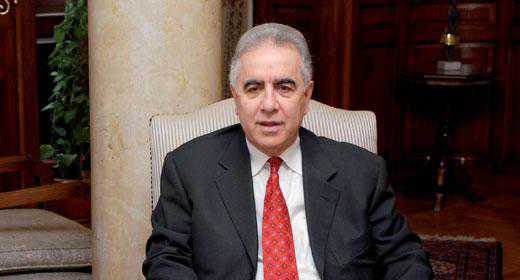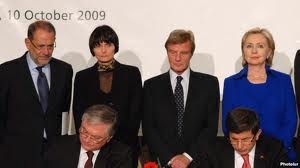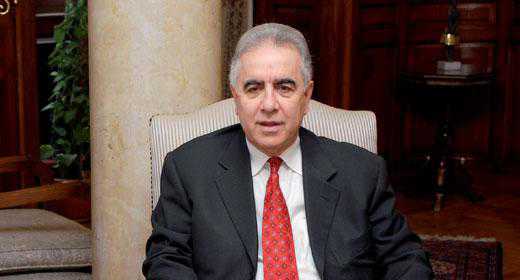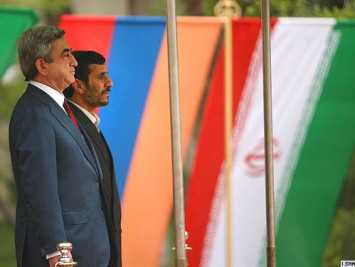The balance in Caucasia that shifted with the collapse of the Soviet Union caused a big change in the foreign policy vision of the states in the region. While examining the problems that emerged between republics, which gained their sovereignty, it is possible to see the changes in foreign policy of neighboring countries. (more…)
Category: Authors
-

IT CAN NOT HAPPEN TO ME. CHAPTER 14
IT WILL NOT HAPPEN TO ME. GUESS WHAT? IT WILL!!
Chapter 14
Pity the Greek Citizens – Not the Politicians
What you see and hear about Greece will slowly come our way. Socialism is a great deal for the politicians as long as they can provide openhanded gifts to the populace. As long as they could borrow money and put off the consequences until they could leave office – fine.
Once when no one will submit bids for their debt the game is really over. They better have an escape route to Argentina ready.
Once they joined the European Union, they lost their freedom to default for they are now tied to everyone else. A simple solution would be debt holders to forgive interest and go for the principal only. This would cause severe pain among the bankers whose salary is paid. Right now they are still in control, but slowly losing it as citizens start to revolt.
Now dear reader, this is how it will happen to you. Hospitals that depend upon government assistance will start to run out of supplies because they can not pay. Try blood bags, plastic gloves used to stop the spread of diseases’ from staff and patients. Unable to pay staff and nurses, and to matters worse all medical plans must be p[aid in full first.
Utilities can not pay for gas from Russia’s Gazprom. Italians stop supplying for the same reason and also their need locally overrides the Greeks need.
Greeks import some 40% of their food supplies. All of its oil and gas is imported, and almost all of its drugs and elixirs.
Its main industries are tourism and shipping. With high unemployment and a rising crime rate their outlook is more than bleak.
There is not easy way out for the Greeks, and all the solutions would be long term. Necessity will force changes in life styles. It will not come easily either. What they need is a Pericles and or a Spartan Police force.
Meanwhile Portugal and Spain are not far behind. Then there are the Italians and then France. Eagan Jones has just reduced their rating of Germany to AA, they are a private rating agency that is a step above the rest in my humble opinion.
Another long term solutions is to have term limits for all politicians. This makes it harder for them to con the public. It is more interesting watching a newly elected official trying to win votes knowing that he has a short time to prove his worth to the electorate.
One thing is certain, the world wide economy will be slowing down as countries and their corporations prove their credit worthiness. This era is a “game changer” and we will need new rules and safeguards to protect us from the robber barons of yesteryear.
-

Israel Has One Good Reason For Recognizing the Armenian Genocide

Israel’s Parliament — the Knesset — held “an historic session” on June 12, during which “seven different political parties overwhelmingly endorsed recognition of the Armenian Genocide,” according to Dr. Israel Charny, Executive Director of the Institute on the Holocaust and Genocide in Jerusalem. He cautiously predicted that the Knesset would complete its legislative procedures leading to recognition of the Armenian Genocide.
While acknowledging the Armenian Genocide would be salutary, Israel should have done so long ago. In fact, the Jewish State should have been the first country to recognize the genocide, in view of the awesome legacy of the Holocaust — Shoah. Who should empathize more with the victims of genocide than those who have suffered a similar fate themselves? As Knesset member Nino Abesadze pointed out during the hearing: “It is precisely because we have been a victim people that we do not dare fail to identify with another victim people.” Another influential Knesset member, Zeev Elkin, Chair of the Likud Caucus stated: “We are one of the last nations in the world that has still not recognized the Armenian Genocide. It is our moral responsibility that we have still not met.”
During the June 12 hearing, Knesset Chairman Reuven Rivlin spoke “firmly and inspiringly” with “profound feeling of both a Jewish and an Israeli imperative to extend a long overdue recognition,” Dr. Charny reported. Chairman Rivlin announced that there was no need for a new vote to recognize the Armenian Genocide since the Knesset had already voted unanimously for its recognition last year. Dr. Charny explained that unlike the US Congress, Knesset resolutions first go to the plenary session before being considered by one of its committees. The next step for the Armenian Genocide resolution is the Education Committee, after which it would be sent back to the Knesset for a final vote. Only then it could be said that the Knesset has officially recognized the Armenian Genocide.
One of the unexpected developments at the June 12 hearing was a statement by Minister of Environmental Affairs Gilad Erdan who announced that he was speaking officially on behalf of the government. He stated unambiguously that Israel had decided to recognize the Armenian Genocide. Furthermore, Minister Erdan claimed that “the State of Israel has never denied it, on the contrary, we deplore the [Armenian] genocide.” This was a surprising statement, since it is well known that, under Turkish pressure, Israel has persistently opposed recognition of the Armenian Genocide. Nevertheless, in defiance of Israeli state denialism, on April 24, 2000, Minister of Justice Yossi Beilin and Minister of Education Yossi Sarid acknowledged the Armenian Genocide, prompting the government to repudiate their statements. Beilin had also recognized the genocide in 1994, while serving as Deputy Foreign Minister.
The fact that serious discussions on the Armenian Genocide are now taking place at a time of deteriorating relations between Turkey and Israel raises troubling questions about the motives of the Israeli government. It would be morally repugnant to see the mass murder of a nation being exploited for crass political calculations. Yet, one has to realize that international relations are rarely based on moral principles. Were it not for economic and political considerations, the whole world would have long ago recognized the Armenian Genocide.
While critics may be displeased that Israel is considering recognition of the Armenian Genocide at a time of discord with Turkey, the greater wrong, in my view, was not doing the right thing for all these years. Even now, despite efforts to rectify the past and uphold the truth, some Israeli officials are concerned that raising the Armenian Genocide issue would further exacerbate relations with Turkey. Knesset member Arieh Eldad dismissed such objections by pointing out the illogical stance of the naysayers: “A few years ago, people said we couldn’t talk about it because of our good relations with Turkey. Now people say we can’t talk about it because of our bad relations with Turkey.” Eldad added that when people are reluctant to address moral and ethical issues there is always a claim that the timing of such a discussion is wrong.
There is, however, one red line that no Armenian should cross. Israeli officials have sought to obtain political concessions from Armenia and Armenians in return for genocide recognition. Such demands should be rejected outright since Armenians do not owe anything to Israel for recognizing the genocide — a universally acknowledged historical fact. Israel should recognize the Armenian Genocide simply because it is the right thing to do, reflecting the sentiments of all righteous Jews worldwide.
-

US put pressure on Azerbaijan by «Armenian genocide»

Gulnara Inanch,
Director of Information and Analytical Center Etnoglobus (ethnoglobus.az),
editor of Russian section of Turkishnews American-Turkish Resource website www.turkishnews.com ,
According to BBC, a group of former and present high ranking officials of the US Administration has called the presidential administration to put pressure over the sides for implementation of protocols signed betweenTurkeyandArmeniain 2009. FormerUSSecretary of State Madeleine Albright in her statement before the US Council on Foreign relations said that implementation of the mentioned protocols would serve for improvement of relations between Azerbaijan and Armenia.
However, while speaking of the very issue in her visit toArmenia, US present Secretary of State Hillary Clinton insisted that initial unconditional dialog betweenTurkeyandArmeniawould not have any impact upon Nagorno-Karabakh issue.
Contradiction between the statements of the present Secretary of State Hillary Clinton and Madeleine Albright, who, despite, is not in power but preserved her reputation, is the reflection of US view with regards to the issue.
As you see, White House tries to pull out “Armenian genocide” issue from connection with Azerbaijanby strengthening their attempts to make Turkeyrestore negotiations withArmenia. Because, in order to force Turkey to come to the negotiations without any precondition agreement of officialBakuis required. Statement of Hillary Clinton that Armenian-Azerbaijani conflict has no connection with Turkish-Armenian relations proves it.
Therefore,Washingtontries to persuade Turkey that opening of borders between Turkey and Armenia will cause Armenia to compromise in Nagorno-Karabakh issue. On the other hand, as recognition of “Armenian genocide” is a principal issue for Azerbaijan along with Turkey, it is used as pressure object to Baku and Ankara.
The fact that “Armenian genocide” was the focus of attention again in Israel Knesset on June 12, it should be considered as pressure tool over Turkey and Azerbaijan. It is again proved by the report recently made by Madeline Albright together with former US president George Bush’s national security advisor Steven Hadley where this subject was the focus of attention as well. According to that report, establishment of good relations withIsrael by Turkey will lead to earning support of US Jewish society which will support Turkey to avoid discussion of “Armenian genocide” as in previous years. Israel Foreign Minister Avigdor Liberman, who seeks for strategic cooperation policy with official Baku, said that this issue wouldn’t be discussed for the sake of strategic cooperation with Azerbaijanwhen “Armenian genocide” was focus of attention in Israel Knesset. Israel media that are close to state and power bodies has been asked to be attentive in the sensible issues related to Azerbaijan. Being attentive we can see that Israel media pretext not to see that “Armenian genocide” is brought to focus of attention in Israel Knesset.
Israel is Our Home (IOH) party head secretary Faina Kirschenbaum, Members of Knesset said that IOH – Kadima block would try to avoid discussions of “Armenian genocide” which is brought to focus of attention by the pressure of Israel Armenian church.
But the point is that some Israel politicians and public figures think that the “Armenian genocide” is the issue between Armenia and Turkey and it has nothing with Azerbaijan, especially with Nagorno-Karabakh. Therefore, in order to satisfy society and Jewish lobby, “Armenian genocide” is brought to focus of attention in the Israel Knesset.
Since “Armenian genocide” is the tool of political speculation, attempts by Israel officials to close the subject for the sake of cooperation with Azerbaijan will be temporary and it is expected to be used for the purpose of mollifying Turkey and Azerbaijan.
As we remember, along with speculations around adoption of the law prohibiting denial of “Armenian genocide” in French Senate, “genocide” issue was also brought to the focus of attention in Israel Knesset.
The fact that discussion of “genocide” issue in Knesset is due on June 18, on the eve of meeting between Azerbaijan and Armenian Foreign Ministers in France, is the another proof that this is the pressure method on Azerbaijan during negotiations.
Source New Baku Post (bakupost.az)
-

Sassounian’s column of June 14, 2012
Clinton Should Share the Blame
For Killings of Armenian Soldiers

A tragic pattern of bloody engagements continues to recur along the Armenia-Azerbaijan border at great human cost. Whenever high level visits or international meetings are scheduled on the Artsakh (Karabagh) conflict, Azerbaijan unfailingly initiates attacks on Armenian border guards causing many casualties.
Azerbaijan’s leaders hope that such hostile action would impress upon the mediating countries the urgency of resolving the conflict by pressuring Armenia’s leadership to make territorial concessions on Artsakh.
Last week, Secretary of State Hillary Clinton visited the Caucasus republics. On the day of her arrival in Yerevan, Azeri forces attacked two Armenian border posts, killing three soldiers and wounding many others. In the ensuing days, more Azeri attacks took place, drawing Armenian return fire, resulting in scores of casualties, mostly on the Azeri side.
Armenians expected Secretary Clinton to strongly condemn Azerbaijan after its initial attack. Clearly, the Azeri military action was timed to coincide with her visit to Armenia. Yet, regrettably, the Secretary merely urged both countries to refrain from “the use of force,” stressing that the Artsakh conflict “can be resolved exclusively by peaceful means.” Clinton’s totally unacceptable statement equated the aggressors with the victims. Moreover, by not condemning the Azeri attacks, she actually emboldened Azerbaijan to commit further acts of aggression against Armenia.
Since it is common knowledge that Azerbaijan orchestrates such attacks to coincide with visits of high-ranking officials to the region, Secretary Clinton should have warned Azerbaijan, before embarking on her trip, not to initiate any hostile action while she was in the area. The State Department should have advised the Azeri government that any breach of the ceasefire during the Clinton visit would be personally embarrassing for the Secretary of State, leaving her no choice but to cancel her trip to Baku. Even if such a warning was not issued in advance, Clinton should have refused to go to Baku after the Azeri attacks. Unfortunately, the Secretary placed a higher value on Azeri oil than on Armenian blood. By her actions, she also undermined the international prestige and moral standing of the United States!
As this could be Clinton’s farewell visit to the region — she is retiring from public service later this year — it is regrettable that she will leave behind a legacy of violence and conflict rather than peace and reconciliation. The US Secretary may have come to Yerevan and Baku to encourage a negotiated settlement to the Artsakh conflict, yet she left the region more destabilized than before.
Another factor that has encouraged Azerbaijan to continue its attacks is the inadequate Armenian response to the countless ceasefire violations since 1994. Armenians will be unable to stop Azeri aggression simply by firing back. The Aliyev regime should be made to understand that it would pay a heavy price for breaching the ceasefire. Rather than simply returning fire, the Armenian response should be to neutralize the Azeri military positions responsible for initiating the attacks.
Although some may fear that a more robust Armenian response would lead to all-out conflict, such concerns are misplaced because Azerbaijan is not ready to wage war, according to most military experts. By starting a premature war, the Azeris risk losing even more territories, not to mention the enormous economic losses!
To deter further Azeri aggression and reduce Armenian casualties, here are seven actions that Armenia may consider taking should Azerbaijan continue to violate the ceasefire:
— Respond by targeting Azerbaijan’s petroleum industry, disrupting its oil and gas pipelines. The best defense is a good offense.
— Take preemptive action to neutralize Azeri snipers who regularly target Armenian border guards and civilians in nearby villages.
— After each attack suspend peace talks with Azerbaijan for an indefinite period. One cannot talk peace and fight at the same.
— Demand that all countries refrain from the sale of weapons to Azerbaijan.
— Urge CSTO (Collective Security Treaty Organization), a defense-alliance that includes Armenia, Belarus, Kazakhstan, Kyrgyzstan, Russia, Tajikistan and Uzbekistan, to warn Azerbaijan that any further attacks on Armenia would trigger a collective military response from all CSTO members.
— Declare that Turkey’s support for Azerbaijan in the Artsakh conflict constitutes a hostile act, and hence withdraw Armenia’s signature from the Armenia-Turkey Protocols.
— Recognize the Republic of Artsakh as an independent state and invite other countries to do likewise.
-

All Three Branches of US government Recognize the Armenian Genocide

While readers are generally aware that the Executive and Legislative branches of the US government have recognized the Armenian Genocide, it is not as widely known that the US Judiciary has also reaffirmed the facts of the Armenian Genocide on several occasions. Indeed, all three branches of the US government have gone on record confirming that the Armenian Genocide was indeed a genocide.
The first time that the Executive branch made reference to the Armenian Genocide was back in 1951 in a key document filed by the US government with the International Court of Justice (World Court). It stated: “The Genocide Convention resulted from the inhuman and barbarous practices which prevailed in certain countries prior to and during World War II, when entire religious, racial and national minority groups were threatened with and subjected to deliberate extermination. The practice of genocide has occurred throughout human history. The Roman persecution of the Christians, the Turkish massacres of Armenians, the extermination of millions of Jews and Poles by the Nazis are outstanding examples of the crime of genocide.”
The second reference by the Executive branch to the Armenian Genocide was made by Pres. Ronald Reagan when he issued Presidential Proclamation 4838 on April 22, 1981, in which he stated: “Like the genocide of the Armenians before it, and the genocide of the Cambodians which followed it — and like too many other such persecutions of too many other peoples — the lessons of the Holocaust must never be forgotten.”
The Legislative branch of the US government adopted two resolutions confirming the historical facts of the Armenian Genocide. The first resolution, approved by the US House of Representatives on April 8, 1975, designated April 24, 1975 “as a day of remembrance for all the victims of genocide, especially those of Armenian ancestry who succumbed to the genocide perpetrated in 1915.” A second resolution was adopted by the House of Representatives on September 10, 1984, designating April 24, 1985 “as a day of remembrance for all the victims of genocide, especially the one and one-half million people of Armenian ancestry who were the victims of the genocide perpetrated in Turkey between 1915 and 1923.” In addition, the House adopted two amendments on the Armenian Genocide in the 1996 and 2004 Foreign Operations Appropriation Act.
However, most people are unaware that the Judiciary, the third branch of the US government, has issued at least three federal court rulings concerning the Armenian Genocide:
The first judicial reference to the Armenian Genocide was the unanimous ruling of a three-judge panel of the First Circuit Court of Appeals on August 11, 2010. In a decision written by former US Supreme Court Justice David Souter, the court rejected a claim by an American-Turkish group that a curricular guide issued by the Massachusetts Education Commissioner explicitly referring to the Armenian Genocide should have included “contra-genocide” references.
The second court case involving the Armenian Genocide was the ruling of federal Judge Colleen Kollar-Kotelly on January 26, 2011, in the lawsuits regarding the Armenian Genocide Museum & Memorial in Washington, D.C. In the opening paragraph of her decision, Judge Kollar-Kotelly quoted the chilling words of Adolf Hitler: “Who, after all, speaks today of the annihilation of the Armenians?” She explained that Hitler was referring to “the largely successful efforts by the Ottoman-Turkish government to eliminate the Armenian population living on its historical homeland during the World War I era, known today as the Armenian Genocide.” The Judge stated in a footnote that “the Court’s use of the term ‘genocide’ is not intended to express any opinion on the propriety of that label.”
The third judicial reference to the Armenian Genocide was made on May 3, 2012, by a three-judge panel of the Eighth Circuit Court of Appeals, denying the claim of the Turkish Coalition of America against the University of Minnesota. In a unanimous opinion, the judges referred unambiguously and without qualification to the Armenian Genocide, describing it as “the Turkish genocide of Armenians during World War I.”
With all three independent branches of the US government going on record reaffirming the Armenian Genocide, the United States has gained its rightful place in the list of righteous nations that have recognized the Armenian Genocide. In fact, in many respects, the United States has compiled a more extensive record of acknowledging the Armenian Genocide than most other countries that have merely adopted a legislative resolution on this issue.

